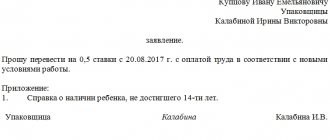What does agency work mean?
Despite the fact that the concept of “agency labor” was officially introduced only on January 1, 2020, in accordance with Federal Law No. 116 of May 5, 2014, which came into force, it has long come into use. Agency labor refers to work performed by an employee at the direction of the employer in the interests, under the direction and control of an individual or legal entity that is not the employee’s employer.
In simple words, agency labor is the transfer of personnel “for rent” under a contract.
For example, a certain company needs specialists to perform obviously temporary functions at the enterprise, and in order not to place new employees on its staff, this company turns to a third-party organization that provides personnel and enters into an agreement with it for the provision of personnel for a certain period, according to after which the “rented” employees stop working.
Or another example: a large construction company uses foreign agency labor in its activities and, in order to avoid the risks associated with the employment of migrants, transfers these employees to the staff of a third-party organization. That is, employees are on the staff of a third-party company, but continue to work at the customer’s facilities through a “lease” agreement or provision of personnel, performing their previous functions, although the role and responsibilities of the employer are borne by another legal entity.
We will tell you in more detail about how agency labor is used in Russia now, what law prohibits the use of agency labor from January 1, 2020, and whether agency labor is actually prohibited in our article. We will also answer the question of whether it is worth looking for ways to circumvent the law banning agency labor or simply contacting a private employment agency that will register all the workers.
Vicarious liability
To ensure guarantees of workers' labor rights in Art. 341.5 of the Labor Code of the Russian Federation provides for subsidiary liability of the receiving party.
Document fragment. Article 341.5 of the Labor Code of the Russian Federation
For the employer’s obligations arising from labor relations with employees sent temporarily to work for the receiving party under an agreement on the provision of labor for employees (personnel), including obligations for the payment of wages and other amounts due to the employee, for the payment of monetary compensation for violation the employer of the established period for payment of wages, vacation pay, dismissal payments and (or) other payments due to the employee, the receiving party bears subsidiary liability.
This provision is intended to protect the interests of the employee as much as possible. If the direct employer violates his rights, the employee will be able to present his demands to him. And in case of refusal, the employee will have the opportunity to hold the subsidiary debtor liable. If, for example, a bankruptcy case is initiated against the employer, in which the employee does not receive any payments, then he can try his luck by filing claims against the receiving party.
New law on agency labor and the use of agency labor in Russia
What is agency labor in Russia? The concept of “agency labor” officially appeared in Russia only in 2020.
Until January 2020, although such a concept existed, it was not spelled out in any regulatory legal acts, and was not regulated in any way by law, which was not prohibited and was widely used simply under other definitions of agency labor: outsourcing, outstaffing, provision of personnel for hire, leasing of personnel and other forms of agency labor.
Since January 1, 2020, the situation in this service sector has changed dramatically - Federal Law No. 116 “On Amendments to Certain Legislative Acts” dated May 5, 2014 came into force, which now regulates issues of agency labor.
From hearsay, many people think that 116 Federal Law is a federal law banning agency labor, but this is not at all the case. Federal Law No. 116 is a Federal Law that does not prohibit agency labor, but regulates the use of agency labor from January 1, 2020 in Russia.
However, you should not be afraid of it, since on the basis of this law, agency labor is not prohibited, but becomes a tangible service within the framework of the law. By introducing the very concept of “agency labor,” they determine the conditions under which legal entities will be able to provide this service and use it.
In other words, no such ban on agency labor has been introduced in Russia since 2016, but now there are some restrictions on the use of agency labor, which we will further consider in more detail.
Who can lend labor, and in what cases is it permissible to use contingent labor now?
Until January 2020, companies providing agency labor could be any legal entity that had the resources to do so, because no special license or permit was needed. Everything was within the legitimate framework of Chapter 39 of the Civil Code of the Russian Federation on the provision of services. Any legal or natural person could also use services of this kind, such as providing personnel for their needs.
However, with the entry into force of the new law on agency labor in 2016, the rules for the provision of agency labor have changed. Now only private employment agencies accredited by ROSTRUD and having the appropriate license can provide agency labor.
Private employment agencies and agency labor: who can provide personnel from 2020
Firstly, according to the law, starting from 2020, agency labor will be able to be provided to companies only in a few cases:
- agency labor and affiliates
The organization sends employees to perform work to its affiliated legal entity, which is a member of the shareholders' agreement.
- Agency labor and private employment agencies
A legal entity accredited by the employment service as a private employment agency will be able to provide personnel for hire.
It is worth noting the particularly strict conditions for a company to obtain accreditation: agency labor and all related services can be provided exclusively by private agencies, for the establishment of which the company will need:
- Authorized capital in the amount of 1 million rubles.
- The general director of such a company must have a higher education in the field of personnel management, as well as work experience in this field for at least three years.
- The general director must have no criminal record.
- The company and the general director have no debts on tax payments and contributions to the treasury of the Russian Federation.
Be careful in 2020, many companies are already interested in how to circumvent the agency labor law in order to provide outstaffing services or sell other forms and “alternatives” to agency labor without the company’s official accreditation as an agency.
Remember that from January 2020, such services in the field of agency labor can only be provided by state-accredited private employment agencies, including the ZaShtatom company.
Agency labor. New rules and restrictions
Agreement
for the processing of personal data
By clicking the “Send request” button, I, acting of my own free will and in my own interests, agree to the processing, disclosure and distribution of my personal data, incl. biometric personal data (using automation tools or without the use of such means), LLC Pryaza "Povolzhye Plants - Vakhta" (Izhevsk, Rodnikovaya St., 72/1, office 2, OGRN 1141831003324), its employees, whose circle determined by order of the Manager of the enterprise, representatives, legal successors presented by me on the website www.zrvahta.ru for the purpose of employment and/or obtaining information.
This consent is valid until its written withdrawal in accordance with the Federal Law of July 27, 2006 No. 152-FZ “On Personal Data”.
List of actions with personal data to which I give consent: processing of personal data, including mixed processing, namely: collection, systematization, accumulation, storage, clarification (updating, changing), extraction, use, transfer, including transfer to third parties (distribution, provision, access), depersonalization, blocking, deletion, destruction of personal data.
I agree that the data provided can be checked or double-checked at any time by the persons indicated above, using any sources of information.
By clicking the “Send request” button I:
1) I confirm that the data I entered (last name, first name, patronymic, profession, specialty, skills, telephone) are correct;
2) I confirm that all data is provided voluntarily;
3) I express my full and unconditional consent to the use of my data to maintain contact with me in any way, including telephone calls to the specified mobile phone, sending SMS messages to the specified mobile phone, in order to inform about vacancies and working conditions, to carry out surveys for the purpose of studying opinions on employment issues, sending news, etc.
Consent is provided by Private Enterprise "Volga Region Plants - Vakhta" LLC (Izhevsk, Rodnikovaya St., 72/1, office 2, OGRN 1141831003324) by me for an indefinite period.
I am informed that consent can be revoked at any time by:
1) sending a written notification to the address: 426000, Izhevsk, st. Rodnikovaya, 72/1 of. 2;
2) sending an email to the address
I have been informed about the Policy for the processing of personal data at PrJSC Volga Region Plants - Vakhta LLC.
Restrictions on agency work
The rules for the provision of personnel, which will limit agency work from 2020, have not remained unchanged:
- According to the conditions, the salary of transferred employees cannot be lower than that of employees of the same specialty of the receiving party.
- An employee transferred under a contract for the provision of agency labor to perform work related to harmful and dangerous working conditions is required to be paid compensation in accordance with the characteristics of the working conditions at the receiving party’s workplace.
- An employee cannot be transferred to perform work at the receiving party for a period of more than 9 months.
- The number of employees transferred to perform work by private employment agencies should not exceed the average number of employees of the receiving party, unless the opinion of the trade union organization of the enterprise to which the transfer of third-party personnel is carried out is taken into account. That is, it will be possible to use agency labor in the amount of more than 10% of the personal staff only with the permission of the trade union organization formed in the company.
Who will provide the staff?
Not everyone will be able to provide staff. Private employment agencies—companies registered in Russia and accredited—will have this right.
Private agencies are subject to increased requirements:
— presence of an authorized capital in the amount of at least 1,000,000 rubles;
— no debt to the budget;
— the head of a higher education agency, as well as work experience in the field of employment or promotion of employment of the population for at least two years over the last three years;
— the head of the agency has no criminal record for committing crimes against the person or crimes in the economic sphere.
At the same time, companies applying special tax regimes (for example, simplified tax system or UTII) will not be able to act as private agencies. This clause is of great importance for tax purposes, since previously the design of outstaffing, as was said, was often used for tax evasion.
Other organizations will also be able to provide personnel. These are primarily parent companies that send their employees to their subsidiaries. However, the procedure and conditions for sending personnel in any case must be regulated by a special federal law, which simply does not exist today.
Ban on agency work from 2020
There are also conditions under which agency labor is completely prohibited.
So, from January 1, 2020, it is prohibited to accept and receive agency labor:
- To perform work classified by labor legislation as hazard classes I and II, as well as for hazardous working conditions of degrees 3 and 4.
- Performing work as forwarders and crew members of sea vessels and mixed navigation vessels.
- To replace employees participating in a strike.
- To carry out work in case of downtime in the production of the receiving party.
- When the receiving party is in the process of bankruptcy.
- When the host party introduces a part-time work regime in order to preserve jobs under the threat of dismissal of employees.
Do you want to use agency labor in 2020?
Despite the law on agency work and all the changes since 2020, and the strict rules for the implementation of activities for the selection and provision of personnel in 2020, agency work in the Russian Federation is not prohibited, it becomes legal.
Strict rules for accreditation of private employment agencies will leave only the strongest companies on the market for this service, which will allow the purchaser of the service to be 100% confident in his counterparty.
is ready for all the changes in 2020 and looks to the future with optimism, preparing for a big step in its history - official accreditation and obtaining a license to provide agency labor in order to continue working in the field of outsourcing and outstaffing of personnel in St. Petersburg.
Call us and find out about all the advantages of agency work in 2018 from our specialists.
World practice of agency labor
Agency labor has been used in world practice for a long time, and currently European employment agencies employ more than 7 million people annually. The use of this form of labor relations is not intended to deprive the employee of certain social guarantees. This process has become objective in the globalization of the economy, and an important point here is the competition between entrepreneurs aimed at maximizing efficiency, as well as between workers who are focused on getting the best offers.
If an enterprise minimizes costs and also reduces production costs, then it gains a competitive advantage in the market. However, in such conditions, personnel are required to constantly prove their professional suitability in order to remain in demand in the labor market. Agency labor in the Russian Federation is just beginning to be actively used according to a similar scheme. Abroad, it is precisely such workers who often receive offers from companies to remain on staff on a permanent basis. In Western countries, the enormous contribution of employment agencies to the labor market is noted, as with their help new jobs are created. This is not a replacement of existing staff positions; more than 80% of the positions that were created in certain companies for agency workers become permanent, since now there is a person who can do it.
So, the law on agency labor has become the very regulator that ensures a certain form of interaction between the employee and the employer, so that there are no questions about the fulfillment of social obligations, or the payment of taxes and other issues. This is why personnel outsourcing in St. Petersburg is becoming such a popular service.









